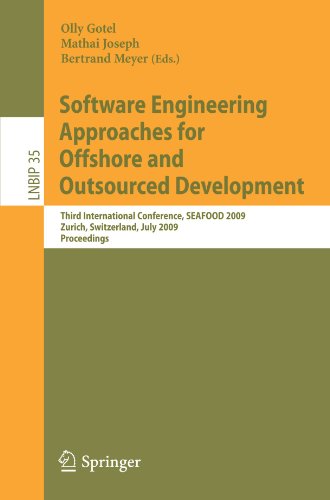Carlo Ghezzi (auth.), Olly Gotel, Mathai Joseph, Bertrand Meyer (eds.)3642029868, 9783642029868
SEAFOOD 2009: Enabling Global Partnerships to Deliver on Business Needs Companies have been outsourcing areas of software development work for many years, either because of the engineering challenges or because the outsourced aspect is not central to their core business. A profound transformation has been a?ecting this model over recent years: a massive transfer of development – tivities from the USA and Europe to a skilled labor force in service-providing countries. This transformation has been driven by the demands of a global bu- ness climate seeking to increase the value delivery of IT investment. However, the ability to realize this value can prove problematic in practice. Of particular concern are the hidden costs of globally distributed models of working, such as understanding and communicating the true business needs across organizational and cultural boundaries. To address such issues, o?shore outsourcing requires di?erent support from in-housedevelopmentandthismeansadaptingfamiliartechniques,processesand tools to this setting, as well as perhaps creating innovative new ones. Coupled with this industry transformation there is hence a pressing need to re-examine thosesoftwareengineeringapproachesthateither facilitate orimpede this model of working. With an inevitable focus on the economy in 2009, business decisions regarding the sourcing of software development projects will come under close scrutiny. It will become increasingly critical to design global partnerships that both clarify cost/bene?ts and enable delivery on business needs. |
Table of contents :
Front Matter….Pages –
Decentralized Software Development: Pitfalls and Challenges….Pages 1-2
An Empiricist View of Managing Globally Distributed Software Development….Pages 3-3
IBM Industry Practice: Challenges in Offshore Software Development from a Global Delivery Center….Pages 4-13
Solution Proposals for Japan-Oriented Offshore Software Development in China….Pages 14-24
Working in Distributed Teams: Challenges, Best Practices, and Guidelines….Pages 25-31
Quantitative CMMI Assessment for Offshoring through the Analysis of Project Management Repositories….Pages 32-44
Predicting Fault-Prone Modules: A Comparative Study….Pages 45-59
Effort Drivers Estimation for Brazilian Geographically Distributed Software Development….Pages 60-65
Challenges for Product Roadmapping in Inter-company Collaboration….Pages 66-80
Global Software Development with Cloud Platforms….Pages 81-95
Competitive Risk Identification Method for Distributed Teams….Pages 96-101
Model-Centric Approach to Software Design and Stakeholder-Specific Architecture Views in Scope of a Financial Institution….Pages 102-116
The Role of Contracts in Distributed Development….Pages 117-129
Managing Communication among Geographically Distributed Teams: A Brazilian Case….Pages 130-135
Back Matter….Pages – |







Reviews
There are no reviews yet.